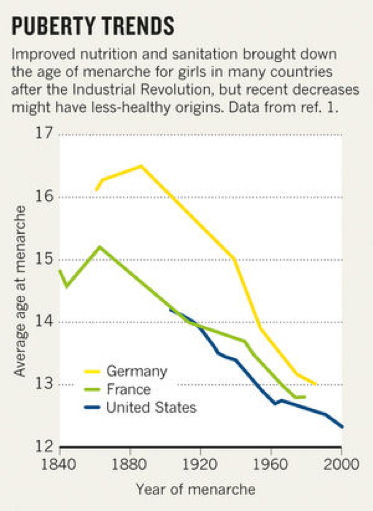Content Sections
A recent article published in one of the world’s most prestigious scientific journals Nature, reveals a startling decline in the average age at which girls enter puberty. With this shift comes a heightened risk of serious health and social problems. In this piece, we ask the question: is this part of an evolutionary cycle or is it a warning sign reminding us of the way our industrialised societies are impacting young girls on which the future of the species is entirely dependent?
Puberty is a normal part of every child’s development. It’s the time when girls — and boys — begin their transition from child to adult in order to be able to sexually reproduce. It’s an evolutionary and primordial mechanism that has ensured the survival of our species. As such, our sexual wellbeing is a prioritised body system that can be used as a reliable barometer for our health status.
Current consensus is that the average age for girls to begin puberty is 11 (while for boys it's 12), with medical authorities accepting as normal girls entering puberty as young as 8. As the Nature piece in the Outlook section of the journal shows (see below), based on previously published data, the average age of menstruation in Western countries (USA, Germany and France) has decreased by over 3 years, and may still be declining.

Source: Nature (2017)
How early is too early?
Female puberty consists of two key milestones – thelarche (breast development) and menarche (start of menstruation), which occur during the 5 Tanner stages of sexual maturation. Sexual maturation heralds a female’s ability to bear children. It’s challenging enough for a 12- or 13-year-old, but are girls as young as 8 mature enough to cope with puberty and the prospect of motherhood? Or is this one of Nature’s red flags signalling to us that we’re too far down a wrong road?
The Nature article raises important concerns over the plummeting age of puberty in girls. Whilst puberty should naturally last 2-4 years, there seems to be some compensatory mechanism in the body that extends puberty for around 6 years for those who start early. Presumably that’s because Mother Nature knows not to entrust the survival of the species to young children.
Triggers for early puberty in girls
It’s scientifically accepted that the reasons for the onset of early puberty are both variable and multi-factorial. Following are a range of factors that have been shown to contribute to the disturbing trend:
- Improved nutrition – children who are under-nourished tend to enter puberty later, whilst giving children adequate nutrients allows them to attain the required weight to trigger puberty
- Obesity – there has been an alarming rise in childhood obesity over the last few decades. Fat tissue is akin to an endocrine organ because of the inflammatory signals it pumps out, which potentially triggers early onset of puberty through metabolic dysregulation. Leptin plays a part in this because it promotes the release of kisspeptin, so the more fat a girl has, the higher the levels of both leptin and kisspeptin — and the earlier she is likely to enter puberty.
- High intake of protein – higher intake of animal protein, particularly from dairy, during childhood is thought to affect children’s growth hormones and may as a result initiate puberty earlier
- Exposure to endocrine disrupting chemicals – Endocrine disrupting chemicals (EDCs) are chemicals that mimic the effects of oestrogen. They are known to affect sexual development and function in male fish. It is now thought that exposure to such chemicals in food, water, pharmaceuticals, cosmetics, toiletries, food contact plastics, etc. may also be affecting children’s endocrine systems and contributing to early onset puberty and infertility in later life.
- Psycho-social stress – with modern life has come increased levels of chronic stress, including the breakdown of family units, the increase in single parent families and the loss of community in society.
- Early sexualisation – the sexualisation of children has increased over recent years. Girls are expected to dress and behave provocatively and conform to the stereotypes created by easily accessible pornography. This brings an added layer of stress to children already affected by family breakdown.
- Increased use of antibiotics – antibiotic use can change the make-up and function of our microbiome. These changes and the associated hormone disruptions have been associated with weight gain in children leading to the suite of metabolic dysregulation detailed above.
- Genetics – central precocious puberty is a genetic condition that causes early sexual development in both girls and boys
Should we be concerned?

The short answer is yes, because science and experience tells us that early puberty in girls comes with an increased risk of adverse health outcomes in later life. Some of these include:
- Breast cancer
- Ovarian cancer
- Developing mental health issues
- Early menopause
- Premature ageing
- Early pregnancy – with early puberty comes the risk of early sexual interactions and the potential for pregnancy
- Increased risk of contracting sexually transmitted infections (STIs) due to early sexual activity, particularly HPV infection, purported to be a cause of cervical cancer in later life and the reason for the HPV vaccination programme.
What can you do if you have young daughters?
- Reduce their exposure to endocrine disrupting chemicals – use reverse osmosis water filters to remove hormones in tap water. Modern RO filters have integral units to replace essential trace and ultra-trace minerals that are removed during filtration. Use natural cosmetics and toiletries, free from harmful chemicals (refer to EWG database for examples of cosmetics).
- Help them to maintain a healthy weight - prepare and eat wholefoods as set out in the ANH-Intl Food4Kids guidelines and Food4Health guidelines
- Sex education – take it upon yourself to talk to them about sex and relationships to ensure they are secure and confident in making the right decision for themselves, without being pressured by others
- The importance of family – in today’s society it is more important than ever to preserve the essence of family (which may or may not be blood-related), particularly when families split due to parental separation. Children fare better when they feel safe and supported through life transitions, especially when those transitions occur near puberty.
- Help them build a community – young people need to be able to form a sense of identity and belonging so they can feel safe. As supportive as their family unit may be, not all their needs are likely to be met because community is a strong evolutionary requirement. Help your daughters to form friendships by encouraging them to join clubs and allowing them to spend time with friends and their friends’ families. Help them to reduce time spent in virtual social realities which are increasingly commonplace because of mobile and wireless technologies.








Comments
your voice counts
There are currently no comments on this post.
Your voice counts
We welcome your comments and are very interested in your point of view, but we ask that you keep them relevant to the article, that they be civil and without commercial links. All comments are moderated prior to being published. We reserve the right to edit or not publish comments that we consider abusive or offensive.
There is extra content here from a third party provider. You will be unable to see this content unless you agree to allow Content Cookies. Cookie Preferences